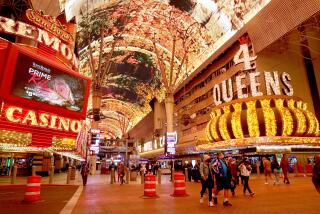Atlantic City’s winning streak could end
- Share via
ATLANTIC CITY, N.J. — Ever since casino gambling began here in 1978, revenue at the gambling halls has been on a one-way trip -- straight up.
But this year, for the first time, annual revenue from Atlantic City’s casinos could decline. The industry faces increased competition from slot machines in neighboring states, new restrictions on smoking and the closing of one casino.
The first monthly revenue figures of the new year were down, raising concern that it could be the start of a yearlong trend.
If revenue does go down, it could have negative consequences for the industry, its customers and the state of New Jersey, which relies on casino taxes.
“There will be an impact, no doubt,” said Carlos Tolosa, eastern division president for Harrah’s Entertainment Inc. “The Pennsylvania slot parlors will certainly cause competition. In the past, people just came to Atlantic City. That’s the part that always scares you. Atlantic City relies on high-frequency customers.”
Already, Pennsylvania slot parlors are cutting into Atlantic City’s pie. Figures for January, when Atlantic City went headto-head with two new Philadelphia-area slot parlors, had New Jersey casino executives reaching for the antacid tablets. Overall revenue at Atlantic City casinos declined 2.9% from a year earlier, but the decline in slot machine revenue was even sharper at 7.2%.
Philadelphia Park Casino & Racetrack in Bensalem Township, about 20 miles north of Philadelphia, opened Dec. 19. Harrah’s Chester Casino and Racetrack opened Jan. 22. Executives of those gambling halls said they were targeting gamblers who otherwise would have gone to Atlantic City.
On the Atlantic City Expressway, among the billboards featuring local entertainers and buffet deals, one billboard for Delaware Park Racetrack in Wilmington, Del., beckons departing drivers to “come play with us” next time.
But what’s bad for the casinos may be good for their customers, at least in the short term. Many observers say they expect casinos to be even more aggressive about offering financial incentives such as free rooms or show tickets to keep players coming.
Also, a revenue dip may only accelerate a movement already well underway here: making sure there’s a lot more to do in Atlantic City than just gamble.
“Clearly, Atlantic City recognizes that for its overall revenue to grow, it has to become less gaming-centric,” said Joseph Weinert, vice president of Spectrum Gaming Group, a casino consulting firm.
“A majority of Atlantic City’s customers will be able to play slots somewhere closer to home. Atlantic City has to give them a compelling reason to drive farther, stay longer and spend more,” he said.
Lorrie Harm came here to the Borgata Hotel Casino & Spa to play the slots, when she easily could have gone to a Philadelphia-area gaming parlor near her home in Cherry Hill, N.J.
“The restaurants are great, and I love to shop,” she said. “I like the atmosphere here. There’s more to do.”
Barbara Sieminski, a retiree from Mountaintop, Pa., said she came to the Borgata at least once a month for amenities such as the manicure she treated herself to last week.
“It’s difficult to just spend time on the gambling floor morning to night,” she said as a manicurist rubbed her hands up and down Sieminski’s wrists. “I come for the total package. Coming to Atlantic City is like a vacation for us.”
Weinert said he expected overall 2007 revenue to be about flat, with a possible fluctuation of 1 percentage point above or below the break-even point. But Frank Fantini, publisher of the Gaming Morning Report, says a decline of as much as 5% is possible this year.
In 2006, Atlantic City’s revenue came in at $5.2 billion, up 4% from the year before.
The closing in November of the Sands Casino and Hotel also is expected to hurt the bottom line.
“Some of that money will flow to other casinos, but some of it won’t be recovered until another property takes its place,” Fantini said. Eleven Atlantic City casinos remain.
Smoking restrictions are another wild card. As of April 15, casinos must designate at least 75% of their gambling floors as smoke-free. The industry is worried about losing its smoking patrons, as well as the millions of dollars it will cost each property to wall off smoking areas and install expensive ventilation systems.
The state has an interest in keeping casino revenue flowing as well. The casinos pay 8% tax on their gross revenues and an additional 1.25% toward projects approved by the Casino Reinvestment Development Authority. Last year, that worked out to $417.5 million in revenue taxes and $65.2 million in reinvestment obligations.
But even if revenue declines this year, almost no one believes that it would be an irreversible trend. Tolosa of Harrah’s noted that casinos were shut down in July during a state budget crisis, a revenue loss he didn’t expect to recur this year.
Three casinos are adding 2,500 hotel rooms in the next several years, and still other companies are considering building gaming halls here.
“I don’t think anybody doubts that long term, Atlantic City is going to remain a powerhouse,” Fantini said.
More to Read
Sign up for Essential California
The most important California stories and recommendations in your inbox every morning.
You may occasionally receive promotional content from the Los Angeles Times.









